Leadership and Leading: Power, Politics, and Conflict Analysis Report
VerifiedAdded on 2023/06/10
|10
|3299
|172
Report
AI Summary
This report examines leadership, power dynamics, organizational politics, and conflict management within the context of Boohoo Group Plc. It begins with an introduction to leadership and its significance in setting goals, motivating employees, and achieving organizational objectives. The report then delves into an academic evaluation of power, exploring different types such as coercive, reward, legitimate, expert, referent, and informational power, and their implications within the company. It analyzes organizational politics, drawing upon Machiavelli's insights, and discusses the impact of both positive and negative political environments on employee performance and organizational culture. Finally, the report addresses conflict, outlining various types and management strategies, including interpersonal issues and poor work habits, and concludes by connecting these theories with real-world business experiences within Boohoo Group Plc, highlighting the practical application of leadership concepts.
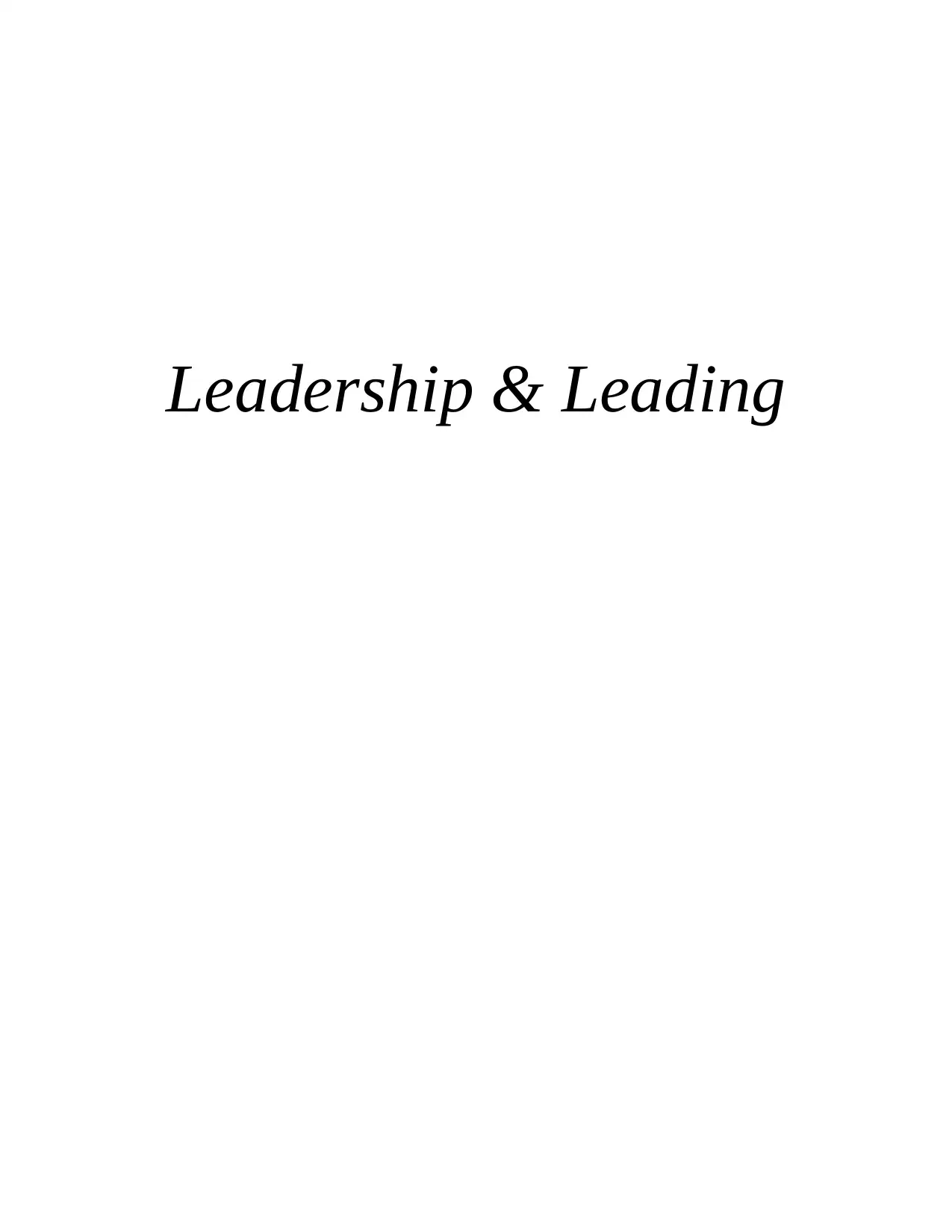
Leadership & Leading
Paraphrase This Document
Need a fresh take? Get an instant paraphrase of this document with our AI Paraphraser
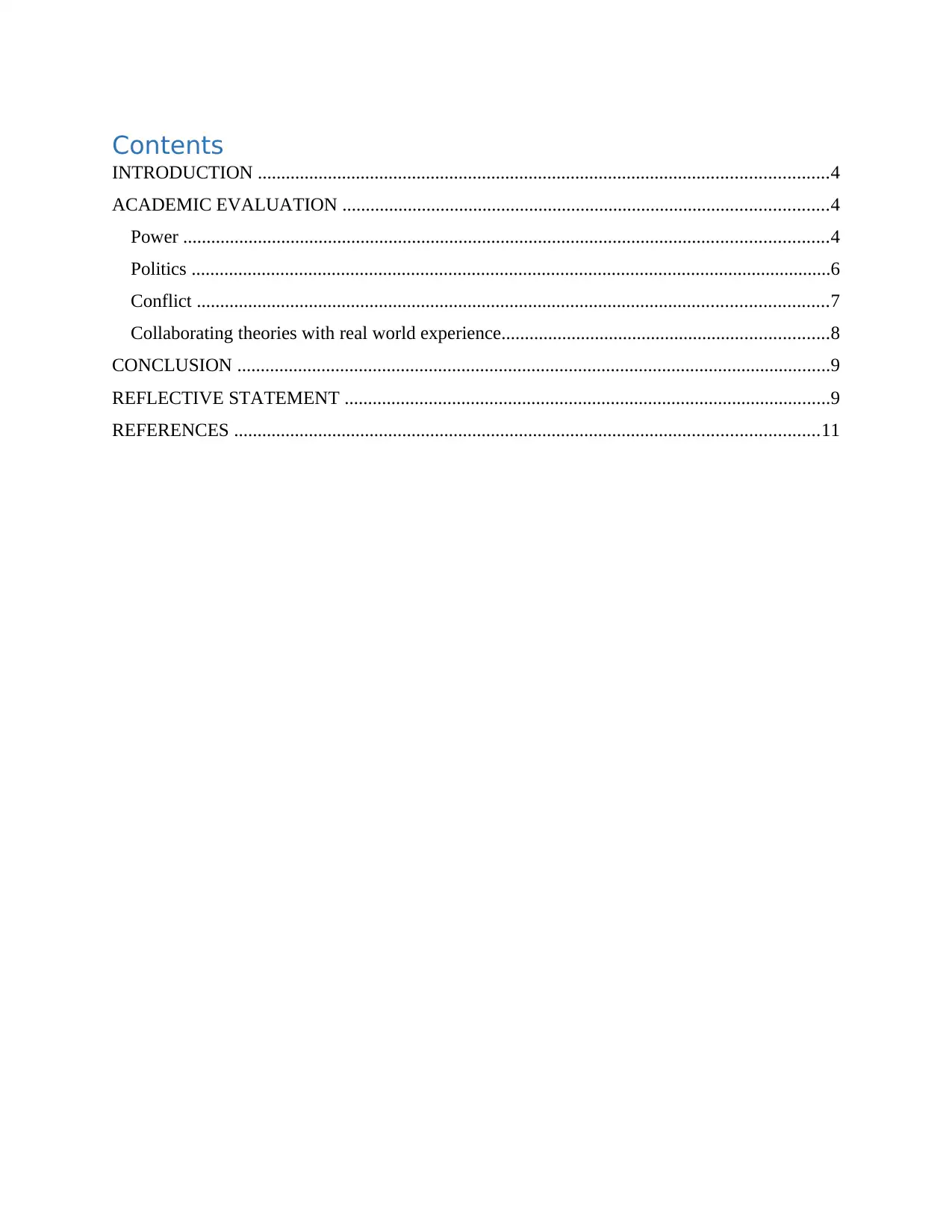
Contents
INTRODUCTION ..........................................................................................................................4
ACADEMIC EVALUATION ........................................................................................................4
Power ..........................................................................................................................................4
Politics .........................................................................................................................................6
Conflict .......................................................................................................................................7
Collaborating theories with real world experience......................................................................8
CONCLUSION ...............................................................................................................................9
REFLECTIVE STATEMENT ........................................................................................................9
REFERENCES .............................................................................................................................11
INTRODUCTION ..........................................................................................................................4
ACADEMIC EVALUATION ........................................................................................................4
Power ..........................................................................................................................................4
Politics .........................................................................................................................................6
Conflict .......................................................................................................................................7
Collaborating theories with real world experience......................................................................8
CONCLUSION ...............................................................................................................................9
REFLECTIVE STATEMENT ........................................................................................................9
REFERENCES .............................................................................................................................11
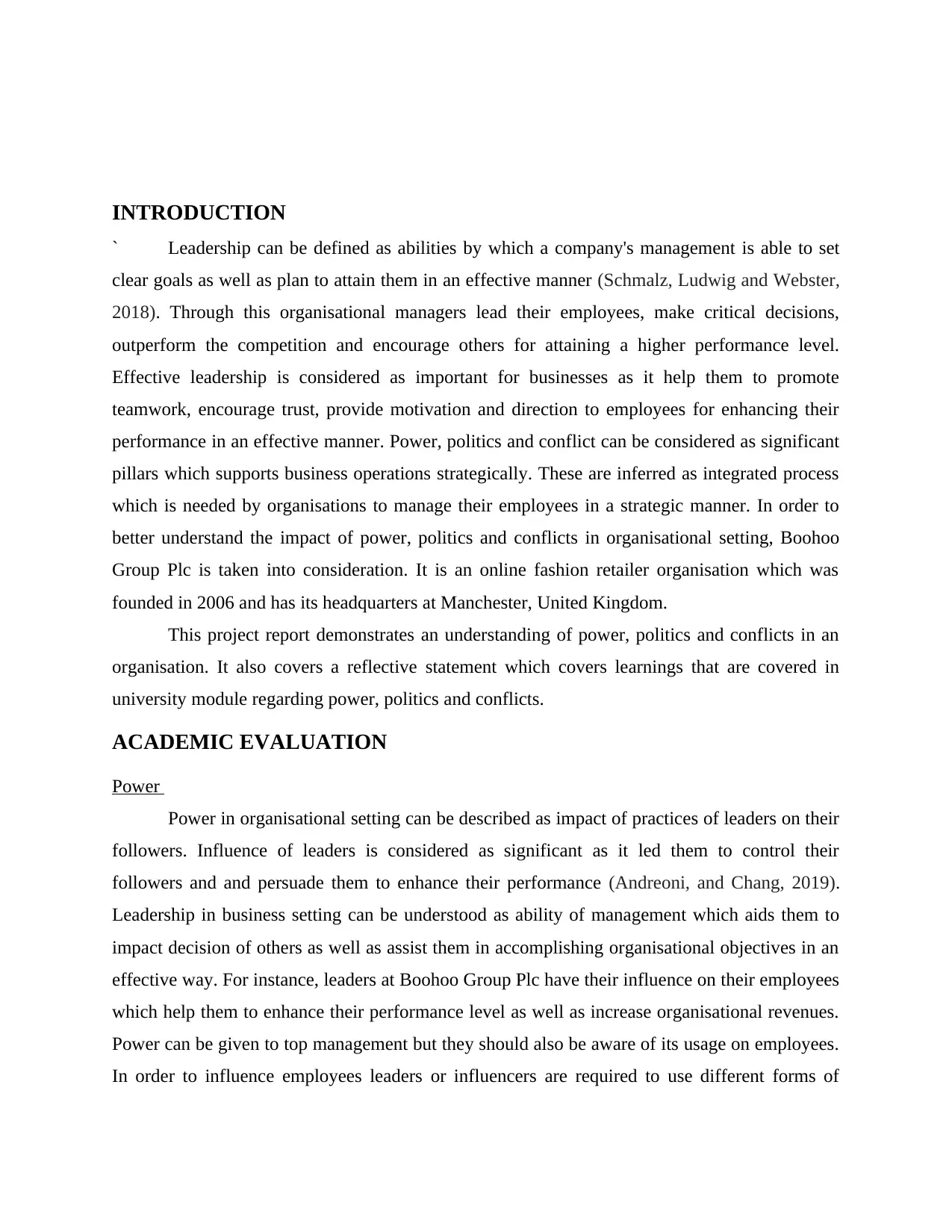
INTRODUCTION
` Leadership can be defined as abilities by which a company's management is able to set
clear goals as well as plan to attain them in an effective manner (Schmalz, Ludwig and Webster,
2018). Through this organisational managers lead their employees, make critical decisions,
outperform the competition and encourage others for attaining a higher performance level.
Effective leadership is considered as important for businesses as it help them to promote
teamwork, encourage trust, provide motivation and direction to employees for enhancing their
performance in an effective manner. Power, politics and conflict can be considered as significant
pillars which supports business operations strategically. These are inferred as integrated process
which is needed by organisations to manage their employees in a strategic manner. In order to
better understand the impact of power, politics and conflicts in organisational setting, Boohoo
Group Plc is taken into consideration. It is an online fashion retailer organisation which was
founded in 2006 and has its headquarters at Manchester, United Kingdom.
This project report demonstrates an understanding of power, politics and conflicts in an
organisation. It also covers a reflective statement which covers learnings that are covered in
university module regarding power, politics and conflicts.
ACADEMIC EVALUATION
Power
Power in organisational setting can be described as impact of practices of leaders on their
followers. Influence of leaders is considered as significant as it led them to control their
followers and and persuade them to enhance their performance (Andreoni, and Chang, 2019).
Leadership in business setting can be understood as ability of management which aids them to
impact decision of others as well as assist them in accomplishing organisational objectives in an
effective way. For instance, leaders at Boohoo Group Plc have their influence on their employees
which help them to enhance their performance level as well as increase organisational revenues.
Power can be given to top management but they should also be aware of its usage on employees.
In order to influence employees leaders or influencers are required to use different forms of
` Leadership can be defined as abilities by which a company's management is able to set
clear goals as well as plan to attain them in an effective manner (Schmalz, Ludwig and Webster,
2018). Through this organisational managers lead their employees, make critical decisions,
outperform the competition and encourage others for attaining a higher performance level.
Effective leadership is considered as important for businesses as it help them to promote
teamwork, encourage trust, provide motivation and direction to employees for enhancing their
performance in an effective manner. Power, politics and conflict can be considered as significant
pillars which supports business operations strategically. These are inferred as integrated process
which is needed by organisations to manage their employees in a strategic manner. In order to
better understand the impact of power, politics and conflicts in organisational setting, Boohoo
Group Plc is taken into consideration. It is an online fashion retailer organisation which was
founded in 2006 and has its headquarters at Manchester, United Kingdom.
This project report demonstrates an understanding of power, politics and conflicts in an
organisation. It also covers a reflective statement which covers learnings that are covered in
university module regarding power, politics and conflicts.
ACADEMIC EVALUATION
Power
Power in organisational setting can be described as impact of practices of leaders on their
followers. Influence of leaders is considered as significant as it led them to control their
followers and and persuade them to enhance their performance (Andreoni, and Chang, 2019).
Leadership in business setting can be understood as ability of management which aids them to
impact decision of others as well as assist them in accomplishing organisational objectives in an
effective way. For instance, leaders at Boohoo Group Plc have their influence on their employees
which help them to enhance their performance level as well as increase organisational revenues.
Power can be given to top management but they should also be aware of its usage on employees.
In order to influence employees leaders or influencers are required to use different forms of
⊘ This is a preview!⊘
Do you want full access?
Subscribe today to unlock all pages.

Trusted by 1+ million students worldwide
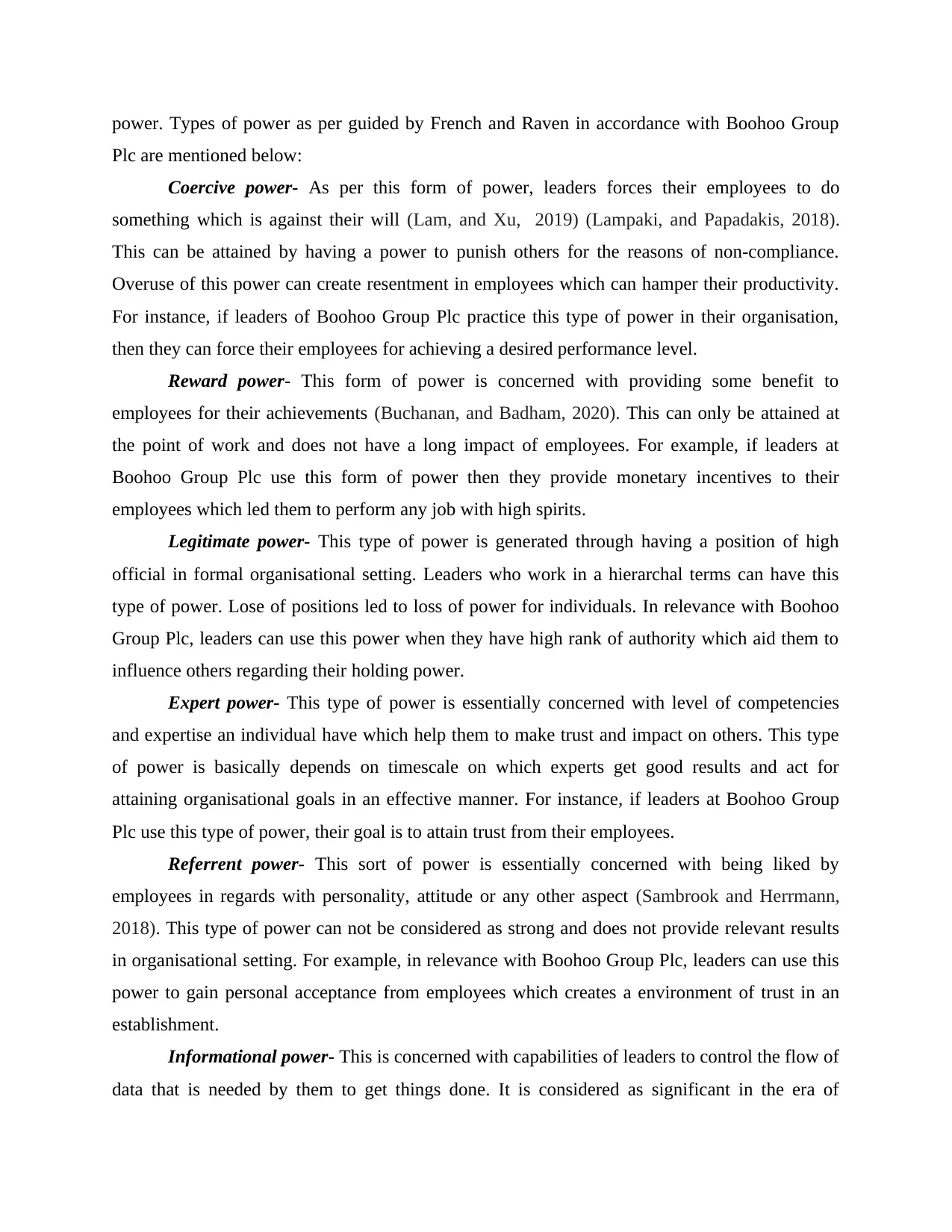
power. Types of power as per guided by French and Raven in accordance with Boohoo Group
Plc are mentioned below:
Coercive power- As per this form of power, leaders forces their employees to do
something which is against their will (Lam, and Xu, 2019) (Lampaki, and Papadakis, 2018).
This can be attained by having a power to punish others for the reasons of non-compliance.
Overuse of this power can create resentment in employees which can hamper their productivity.
For instance, if leaders of Boohoo Group Plc practice this type of power in their organisation,
then they can force their employees for achieving a desired performance level.
Reward power- This form of power is concerned with providing some benefit to
employees for their achievements (Buchanan, and Badham, 2020). This can only be attained at
the point of work and does not have a long impact of employees. For example, if leaders at
Boohoo Group Plc use this form of power then they provide monetary incentives to their
employees which led them to perform any job with high spirits.
Legitimate power- This type of power is generated through having a position of high
official in formal organisational setting. Leaders who work in a hierarchal terms can have this
type of power. Lose of positions led to loss of power for individuals. In relevance with Boohoo
Group Plc, leaders can use this power when they have high rank of authority which aid them to
influence others regarding their holding power.
Expert power- This type of power is essentially concerned with level of competencies
and expertise an individual have which help them to make trust and impact on others. This type
of power is basically depends on timescale on which experts get good results and act for
attaining organisational goals in an effective manner. For instance, if leaders at Boohoo Group
Plc use this type of power, their goal is to attain trust from their employees.
Referrent power- This sort of power is essentially concerned with being liked by
employees in regards with personality, attitude or any other aspect (Sambrook and Herrmann,
2018). This type of power can not be considered as strong and does not provide relevant results
in organisational setting. For example, in relevance with Boohoo Group Plc, leaders can use this
power to gain personal acceptance from employees which creates a environment of trust in an
establishment.
Informational power- This is concerned with capabilities of leaders to control the flow of
data that is needed by them to get things done. It is considered as significant in the era of
Plc are mentioned below:
Coercive power- As per this form of power, leaders forces their employees to do
something which is against their will (Lam, and Xu, 2019) (Lampaki, and Papadakis, 2018).
This can be attained by having a power to punish others for the reasons of non-compliance.
Overuse of this power can create resentment in employees which can hamper their productivity.
For instance, if leaders of Boohoo Group Plc practice this type of power in their organisation,
then they can force their employees for achieving a desired performance level.
Reward power- This form of power is concerned with providing some benefit to
employees for their achievements (Buchanan, and Badham, 2020). This can only be attained at
the point of work and does not have a long impact of employees. For example, if leaders at
Boohoo Group Plc use this form of power then they provide monetary incentives to their
employees which led them to perform any job with high spirits.
Legitimate power- This type of power is generated through having a position of high
official in formal organisational setting. Leaders who work in a hierarchal terms can have this
type of power. Lose of positions led to loss of power for individuals. In relevance with Boohoo
Group Plc, leaders can use this power when they have high rank of authority which aid them to
influence others regarding their holding power.
Expert power- This type of power is essentially concerned with level of competencies
and expertise an individual have which help them to make trust and impact on others. This type
of power is basically depends on timescale on which experts get good results and act for
attaining organisational goals in an effective manner. For instance, if leaders at Boohoo Group
Plc use this type of power, their goal is to attain trust from their employees.
Referrent power- This sort of power is essentially concerned with being liked by
employees in regards with personality, attitude or any other aspect (Sambrook and Herrmann,
2018). This type of power can not be considered as strong and does not provide relevant results
in organisational setting. For example, in relevance with Boohoo Group Plc, leaders can use this
power to gain personal acceptance from employees which creates a environment of trust in an
establishment.
Informational power- This is concerned with capabilities of leaders to control the flow of
data that is needed by them to get things done. It is considered as significant in the era of
Paraphrase This Document
Need a fresh take? Get an instant paraphrase of this document with our AI Paraphraser
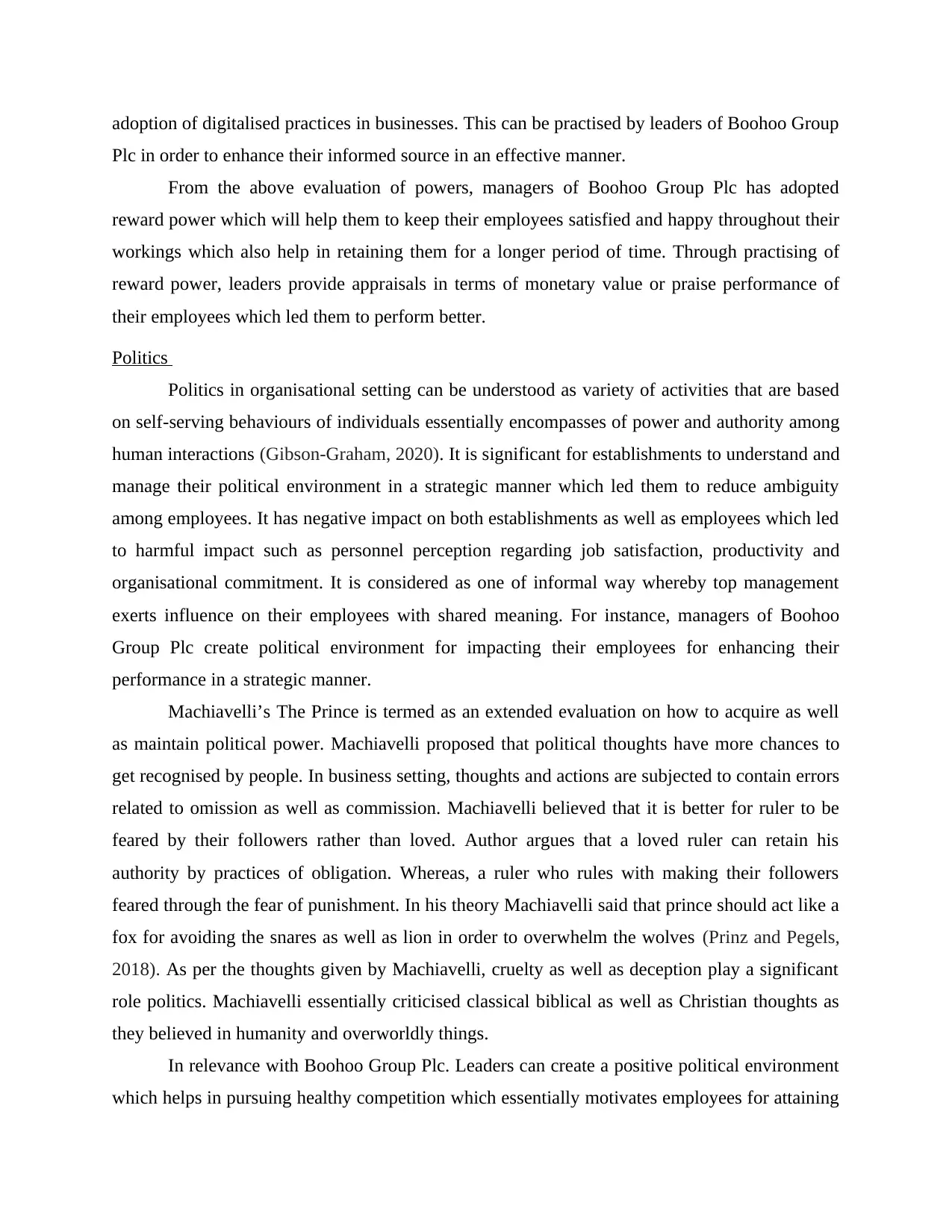
adoption of digitalised practices in businesses. This can be practised by leaders of Boohoo Group
Plc in order to enhance their informed source in an effective manner.
From the above evaluation of powers, managers of Boohoo Group Plc has adopted
reward power which will help them to keep their employees satisfied and happy throughout their
workings which also help in retaining them for a longer period of time. Through practising of
reward power, leaders provide appraisals in terms of monetary value or praise performance of
their employees which led them to perform better.
Politics
Politics in organisational setting can be understood as variety of activities that are based
on self-serving behaviours of individuals essentially encompasses of power and authority among
human interactions (Gibson-Graham, 2020). It is significant for establishments to understand and
manage their political environment in a strategic manner which led them to reduce ambiguity
among employees. It has negative impact on both establishments as well as employees which led
to harmful impact such as personnel perception regarding job satisfaction, productivity and
organisational commitment. It is considered as one of informal way whereby top management
exerts influence on their employees with shared meaning. For instance, managers of Boohoo
Group Plc create political environment for impacting their employees for enhancing their
performance in a strategic manner.
Machiavelli’s The Prince is termed as an extended evaluation on how to acquire as well
as maintain political power. Machiavelli proposed that political thoughts have more chances to
get recognised by people. In business setting, thoughts and actions are subjected to contain errors
related to omission as well as commission. Machiavelli believed that it is better for ruler to be
feared by their followers rather than loved. Author argues that a loved ruler can retain his
authority by practices of obligation. Whereas, a ruler who rules with making their followers
feared through the fear of punishment. In his theory Machiavelli said that prince should act like a
fox for avoiding the snares as well as lion in order to overwhelm the wolves (Prinz and Pegels,
2018). As per the thoughts given by Machiavelli, cruelty as well as deception play a significant
role politics. Machiavelli essentially criticised classical biblical as well as Christian thoughts as
they believed in humanity and overworldly things.
In relevance with Boohoo Group Plc. Leaders can create a positive political environment
which helps in pursuing healthy competition which essentially motivates employees for attaining
Plc in order to enhance their informed source in an effective manner.
From the above evaluation of powers, managers of Boohoo Group Plc has adopted
reward power which will help them to keep their employees satisfied and happy throughout their
workings which also help in retaining them for a longer period of time. Through practising of
reward power, leaders provide appraisals in terms of monetary value or praise performance of
their employees which led them to perform better.
Politics
Politics in organisational setting can be understood as variety of activities that are based
on self-serving behaviours of individuals essentially encompasses of power and authority among
human interactions (Gibson-Graham, 2020). It is significant for establishments to understand and
manage their political environment in a strategic manner which led them to reduce ambiguity
among employees. It has negative impact on both establishments as well as employees which led
to harmful impact such as personnel perception regarding job satisfaction, productivity and
organisational commitment. It is considered as one of informal way whereby top management
exerts influence on their employees with shared meaning. For instance, managers of Boohoo
Group Plc create political environment for impacting their employees for enhancing their
performance in a strategic manner.
Machiavelli’s The Prince is termed as an extended evaluation on how to acquire as well
as maintain political power. Machiavelli proposed that political thoughts have more chances to
get recognised by people. In business setting, thoughts and actions are subjected to contain errors
related to omission as well as commission. Machiavelli believed that it is better for ruler to be
feared by their followers rather than loved. Author argues that a loved ruler can retain his
authority by practices of obligation. Whereas, a ruler who rules with making their followers
feared through the fear of punishment. In his theory Machiavelli said that prince should act like a
fox for avoiding the snares as well as lion in order to overwhelm the wolves (Prinz and Pegels,
2018). As per the thoughts given by Machiavelli, cruelty as well as deception play a significant
role politics. Machiavelli essentially criticised classical biblical as well as Christian thoughts as
they believed in humanity and overworldly things.
In relevance with Boohoo Group Plc. Leaders can create a positive political environment
which helps in pursuing healthy competition which essentially motivates employees for attaining
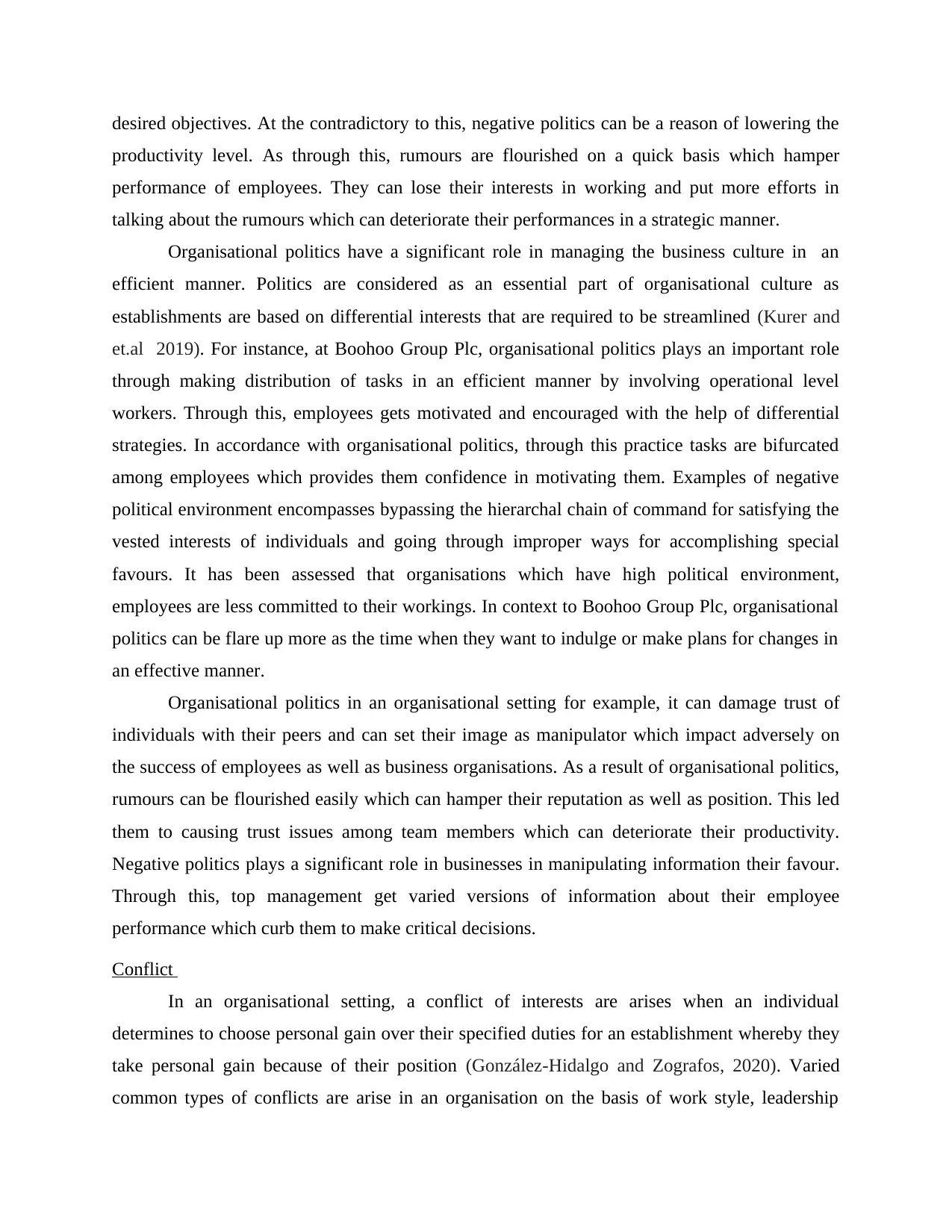
desired objectives. At the contradictory to this, negative politics can be a reason of lowering the
productivity level. As through this, rumours are flourished on a quick basis which hamper
performance of employees. They can lose their interests in working and put more efforts in
talking about the rumours which can deteriorate their performances in a strategic manner.
Organisational politics have a significant role in managing the business culture in an
efficient manner. Politics are considered as an essential part of organisational culture as
establishments are based on differential interests that are required to be streamlined (Kurer and
et.al 2019). For instance, at Boohoo Group Plc, organisational politics plays an important role
through making distribution of tasks in an efficient manner by involving operational level
workers. Through this, employees gets motivated and encouraged with the help of differential
strategies. In accordance with organisational politics, through this practice tasks are bifurcated
among employees which provides them confidence in motivating them. Examples of negative
political environment encompasses bypassing the hierarchal chain of command for satisfying the
vested interests of individuals and going through improper ways for accomplishing special
favours. It has been assessed that organisations which have high political environment,
employees are less committed to their workings. In context to Boohoo Group Plc, organisational
politics can be flare up more as the time when they want to indulge or make plans for changes in
an effective manner.
Organisational politics in an organisational setting for example, it can damage trust of
individuals with their peers and can set their image as manipulator which impact adversely on
the success of employees as well as business organisations. As a result of organisational politics,
rumours can be flourished easily which can hamper their reputation as well as position. This led
them to causing trust issues among team members which can deteriorate their productivity.
Negative politics plays a significant role in businesses in manipulating information their favour.
Through this, top management get varied versions of information about their employee
performance which curb them to make critical decisions.
Conflict
In an organisational setting, a conflict of interests are arises when an individual
determines to choose personal gain over their specified duties for an establishment whereby they
take personal gain because of their position (González-Hidalgo and Zografos, 2020). Varied
common types of conflicts are arise in an organisation on the basis of work style, leadership
productivity level. As through this, rumours are flourished on a quick basis which hamper
performance of employees. They can lose their interests in working and put more efforts in
talking about the rumours which can deteriorate their performances in a strategic manner.
Organisational politics have a significant role in managing the business culture in an
efficient manner. Politics are considered as an essential part of organisational culture as
establishments are based on differential interests that are required to be streamlined (Kurer and
et.al 2019). For instance, at Boohoo Group Plc, organisational politics plays an important role
through making distribution of tasks in an efficient manner by involving operational level
workers. Through this, employees gets motivated and encouraged with the help of differential
strategies. In accordance with organisational politics, through this practice tasks are bifurcated
among employees which provides them confidence in motivating them. Examples of negative
political environment encompasses bypassing the hierarchal chain of command for satisfying the
vested interests of individuals and going through improper ways for accomplishing special
favours. It has been assessed that organisations which have high political environment,
employees are less committed to their workings. In context to Boohoo Group Plc, organisational
politics can be flare up more as the time when they want to indulge or make plans for changes in
an effective manner.
Organisational politics in an organisational setting for example, it can damage trust of
individuals with their peers and can set their image as manipulator which impact adversely on
the success of employees as well as business organisations. As a result of organisational politics,
rumours can be flourished easily which can hamper their reputation as well as position. This led
them to causing trust issues among team members which can deteriorate their productivity.
Negative politics plays a significant role in businesses in manipulating information their favour.
Through this, top management get varied versions of information about their employee
performance which curb them to make critical decisions.
Conflict
In an organisational setting, a conflict of interests are arises when an individual
determines to choose personal gain over their specified duties for an establishment whereby they
take personal gain because of their position (González-Hidalgo and Zografos, 2020). Varied
common types of conflicts are arise in an organisation on the basis of work style, leadership
⊘ This is a preview!⊘
Do you want full access?
Subscribe today to unlock all pages.

Trusted by 1+ million students worldwide
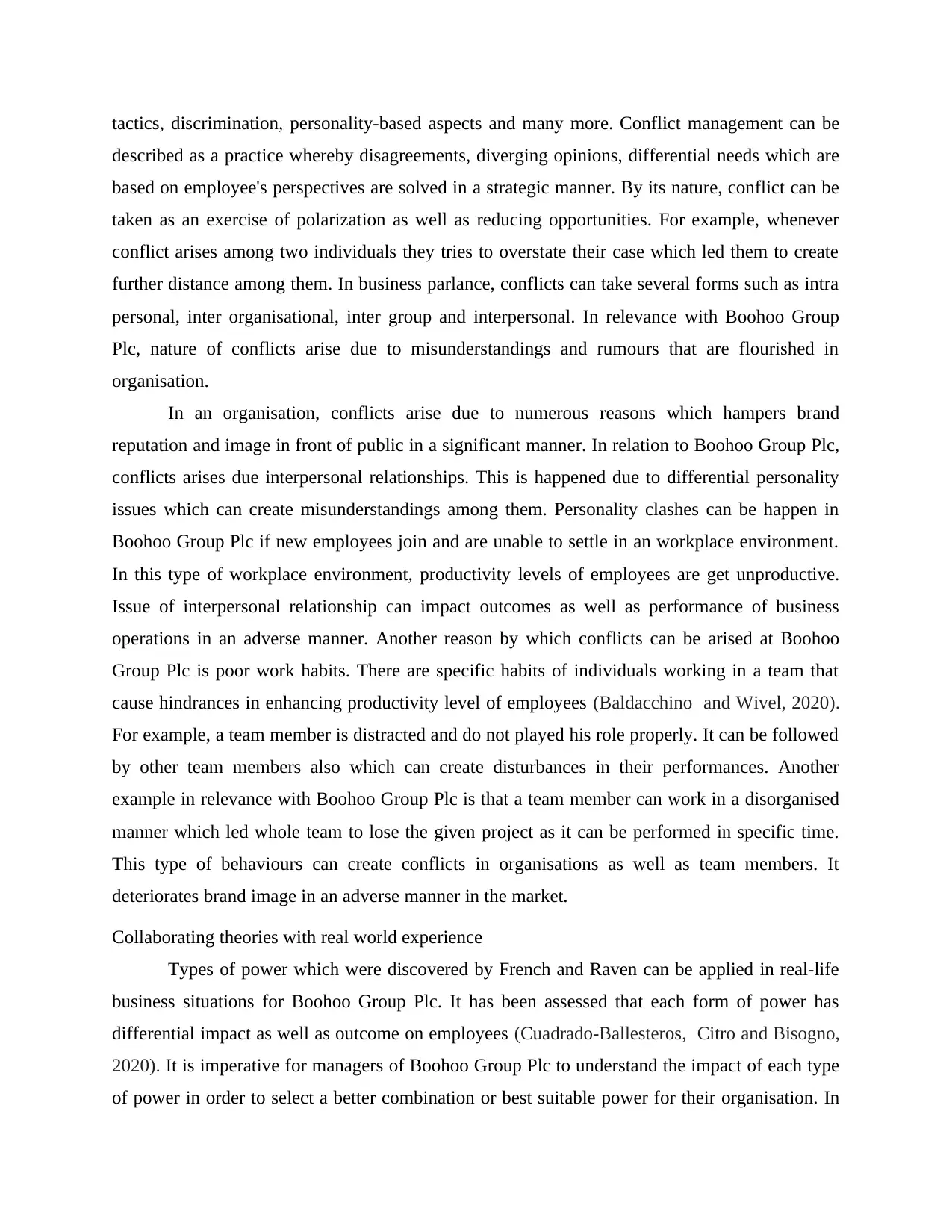
tactics, discrimination, personality-based aspects and many more. Conflict management can be
described as a practice whereby disagreements, diverging opinions, differential needs which are
based on employee's perspectives are solved in a strategic manner. By its nature, conflict can be
taken as an exercise of polarization as well as reducing opportunities. For example, whenever
conflict arises among two individuals they tries to overstate their case which led them to create
further distance among them. In business parlance, conflicts can take several forms such as intra
personal, inter organisational, inter group and interpersonal. In relevance with Boohoo Group
Plc, nature of conflicts arise due to misunderstandings and rumours that are flourished in
organisation.
In an organisation, conflicts arise due to numerous reasons which hampers brand
reputation and image in front of public in a significant manner. In relation to Boohoo Group Plc,
conflicts arises due interpersonal relationships. This is happened due to differential personality
issues which can create misunderstandings among them. Personality clashes can be happen in
Boohoo Group Plc if new employees join and are unable to settle in an workplace environment.
In this type of workplace environment, productivity levels of employees are get unproductive.
Issue of interpersonal relationship can impact outcomes as well as performance of business
operations in an adverse manner. Another reason by which conflicts can be arised at Boohoo
Group Plc is poor work habits. There are specific habits of individuals working in a team that
cause hindrances in enhancing productivity level of employees (Baldacchino and Wivel, 2020).
For example, a team member is distracted and do not played his role properly. It can be followed
by other team members also which can create disturbances in their performances. Another
example in relevance with Boohoo Group Plc is that a team member can work in a disorganised
manner which led whole team to lose the given project as it can be performed in specific time.
This type of behaviours can create conflicts in organisations as well as team members. It
deteriorates brand image in an adverse manner in the market.
Collaborating theories with real world experience
Types of power which were discovered by French and Raven can be applied in real-life
business situations for Boohoo Group Plc. It has been assessed that each form of power has
differential impact as well as outcome on employees (Cuadrado-Ballesteros, Citro and Bisogno,
2020). It is imperative for managers of Boohoo Group Plc to understand the impact of each type
of power in order to select a better combination or best suitable power for their organisation. In
described as a practice whereby disagreements, diverging opinions, differential needs which are
based on employee's perspectives are solved in a strategic manner. By its nature, conflict can be
taken as an exercise of polarization as well as reducing opportunities. For example, whenever
conflict arises among two individuals they tries to overstate their case which led them to create
further distance among them. In business parlance, conflicts can take several forms such as intra
personal, inter organisational, inter group and interpersonal. In relevance with Boohoo Group
Plc, nature of conflicts arise due to misunderstandings and rumours that are flourished in
organisation.
In an organisation, conflicts arise due to numerous reasons which hampers brand
reputation and image in front of public in a significant manner. In relation to Boohoo Group Plc,
conflicts arises due interpersonal relationships. This is happened due to differential personality
issues which can create misunderstandings among them. Personality clashes can be happen in
Boohoo Group Plc if new employees join and are unable to settle in an workplace environment.
In this type of workplace environment, productivity levels of employees are get unproductive.
Issue of interpersonal relationship can impact outcomes as well as performance of business
operations in an adverse manner. Another reason by which conflicts can be arised at Boohoo
Group Plc is poor work habits. There are specific habits of individuals working in a team that
cause hindrances in enhancing productivity level of employees (Baldacchino and Wivel, 2020).
For example, a team member is distracted and do not played his role properly. It can be followed
by other team members also which can create disturbances in their performances. Another
example in relevance with Boohoo Group Plc is that a team member can work in a disorganised
manner which led whole team to lose the given project as it can be performed in specific time.
This type of behaviours can create conflicts in organisations as well as team members. It
deteriorates brand image in an adverse manner in the market.
Collaborating theories with real world experience
Types of power which were discovered by French and Raven can be applied in real-life
business situations for Boohoo Group Plc. It has been assessed that each form of power has
differential impact as well as outcome on employees (Cuadrado-Ballesteros, Citro and Bisogno,
2020). It is imperative for managers of Boohoo Group Plc to understand the impact of each type
of power in order to select a better combination or best suitable power for their organisation. In
Paraphrase This Document
Need a fresh take? Get an instant paraphrase of this document with our AI Paraphraser
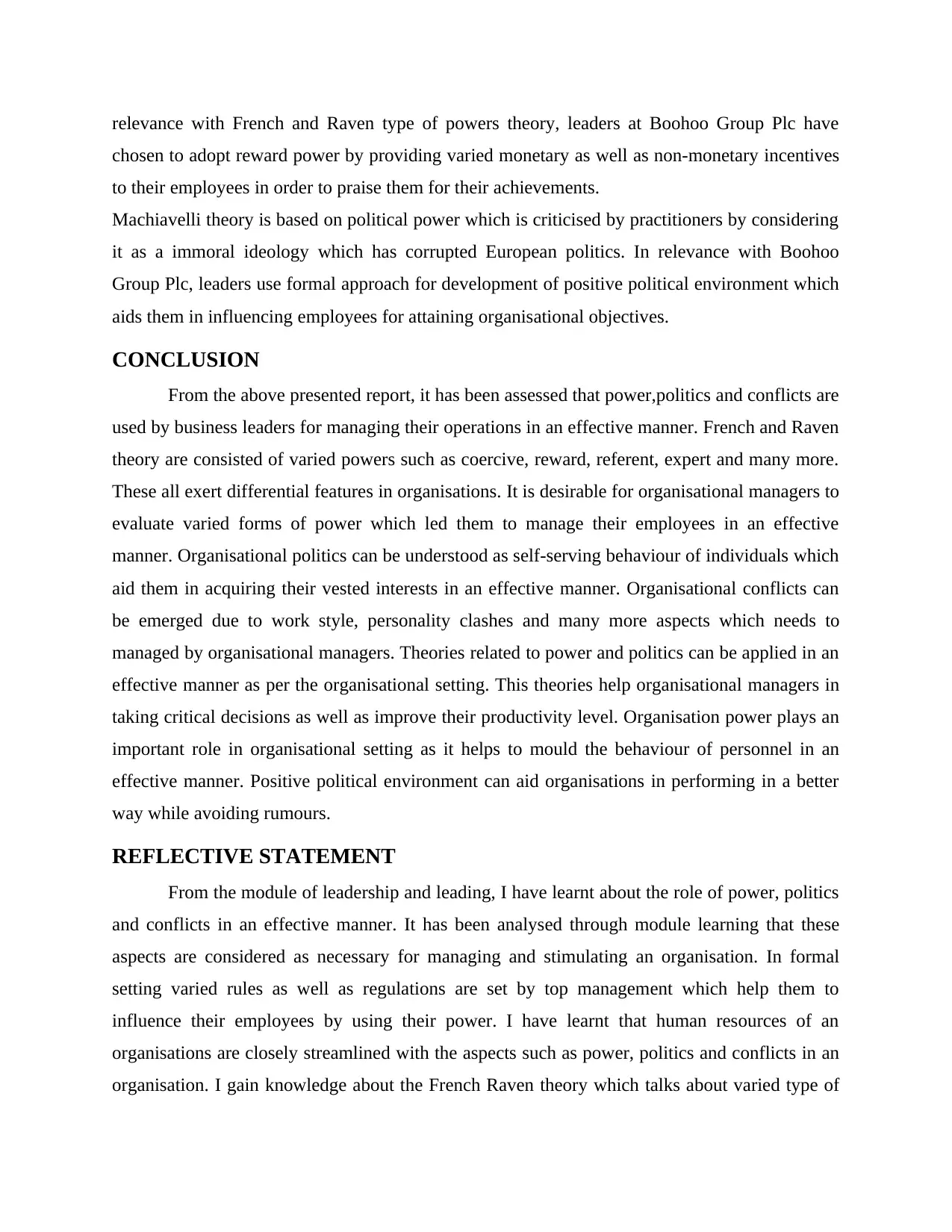
relevance with French and Raven type of powers theory, leaders at Boohoo Group Plc have
chosen to adopt reward power by providing varied monetary as well as non-monetary incentives
to their employees in order to praise them for their achievements.
Machiavelli theory is based on political power which is criticised by practitioners by considering
it as a immoral ideology which has corrupted European politics. In relevance with Boohoo
Group Plc, leaders use formal approach for development of positive political environment which
aids them in influencing employees for attaining organisational objectives.
CONCLUSION
From the above presented report, it has been assessed that power,politics and conflicts are
used by business leaders for managing their operations in an effective manner. French and Raven
theory are consisted of varied powers such as coercive, reward, referent, expert and many more.
These all exert differential features in organisations. It is desirable for organisational managers to
evaluate varied forms of power which led them to manage their employees in an effective
manner. Organisational politics can be understood as self-serving behaviour of individuals which
aid them in acquiring their vested interests in an effective manner. Organisational conflicts can
be emerged due to work style, personality clashes and many more aspects which needs to
managed by organisational managers. Theories related to power and politics can be applied in an
effective manner as per the organisational setting. This theories help organisational managers in
taking critical decisions as well as improve their productivity level. Organisation power plays an
important role in organisational setting as it helps to mould the behaviour of personnel in an
effective manner. Positive political environment can aid organisations in performing in a better
way while avoiding rumours.
REFLECTIVE STATEMENT
From the module of leadership and leading, I have learnt about the role of power, politics
and conflicts in an effective manner. It has been analysed through module learning that these
aspects are considered as necessary for managing and stimulating an organisation. In formal
setting varied rules as well as regulations are set by top management which help them to
influence their employees by using their power. I have learnt that human resources of an
organisations are closely streamlined with the aspects such as power, politics and conflicts in an
organisation. I gain knowledge about the French Raven theory which talks about varied type of
chosen to adopt reward power by providing varied monetary as well as non-monetary incentives
to their employees in order to praise them for their achievements.
Machiavelli theory is based on political power which is criticised by practitioners by considering
it as a immoral ideology which has corrupted European politics. In relevance with Boohoo
Group Plc, leaders use formal approach for development of positive political environment which
aids them in influencing employees for attaining organisational objectives.
CONCLUSION
From the above presented report, it has been assessed that power,politics and conflicts are
used by business leaders for managing their operations in an effective manner. French and Raven
theory are consisted of varied powers such as coercive, reward, referent, expert and many more.
These all exert differential features in organisations. It is desirable for organisational managers to
evaluate varied forms of power which led them to manage their employees in an effective
manner. Organisational politics can be understood as self-serving behaviour of individuals which
aid them in acquiring their vested interests in an effective manner. Organisational conflicts can
be emerged due to work style, personality clashes and many more aspects which needs to
managed by organisational managers. Theories related to power and politics can be applied in an
effective manner as per the organisational setting. This theories help organisational managers in
taking critical decisions as well as improve their productivity level. Organisation power plays an
important role in organisational setting as it helps to mould the behaviour of personnel in an
effective manner. Positive political environment can aid organisations in performing in a better
way while avoiding rumours.
REFLECTIVE STATEMENT
From the module of leadership and leading, I have learnt about the role of power, politics
and conflicts in an effective manner. It has been analysed through module learning that these
aspects are considered as necessary for managing and stimulating an organisation. In formal
setting varied rules as well as regulations are set by top management which help them to
influence their employees by using their power. I have learnt that human resources of an
organisations are closely streamlined with the aspects such as power, politics and conflicts in an
organisation. I gain knowledge about the French Raven theory which talks about varied type of
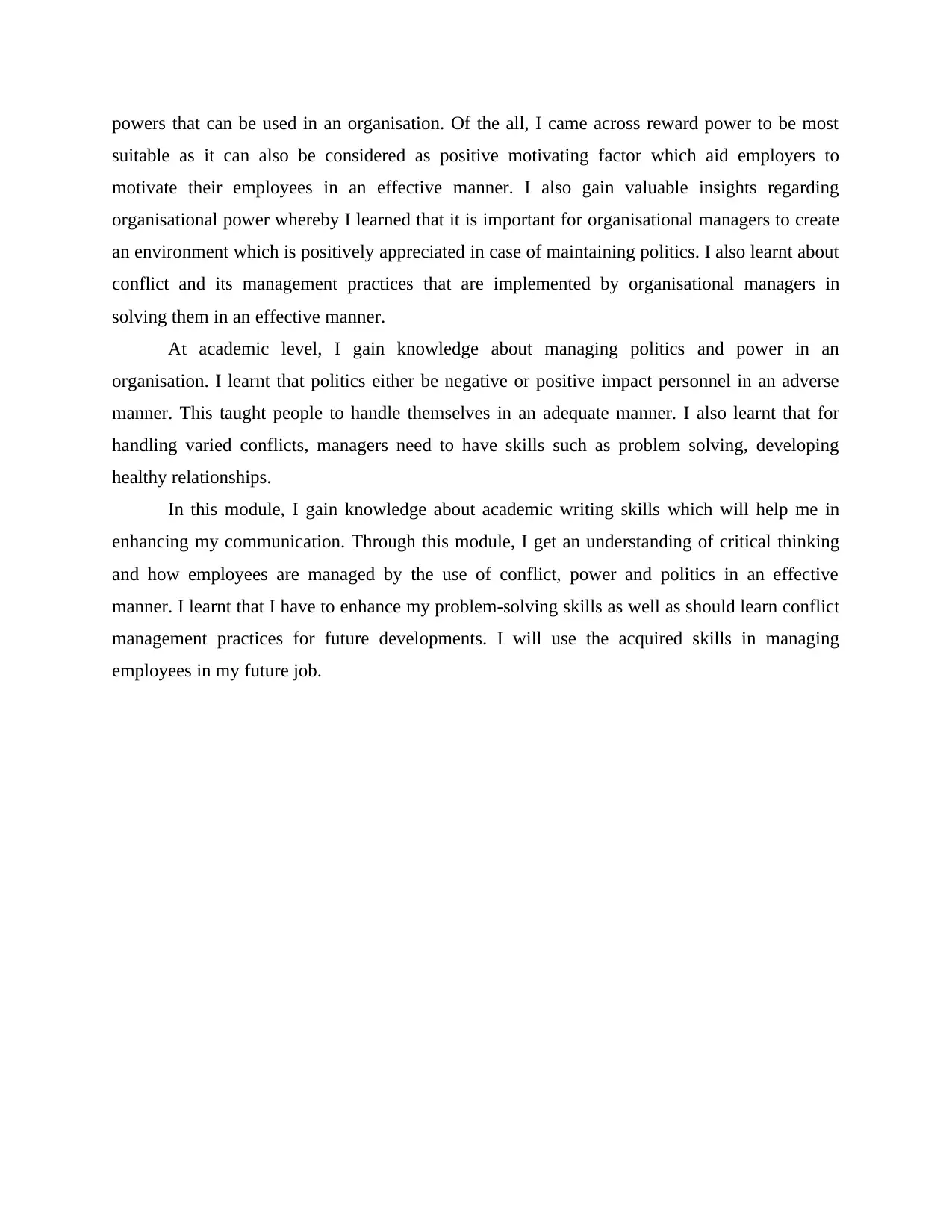
powers that can be used in an organisation. Of the all, I came across reward power to be most
suitable as it can also be considered as positive motivating factor which aid employers to
motivate their employees in an effective manner. I also gain valuable insights regarding
organisational power whereby I learned that it is important for organisational managers to create
an environment which is positively appreciated in case of maintaining politics. I also learnt about
conflict and its management practices that are implemented by organisational managers in
solving them in an effective manner.
At academic level, I gain knowledge about managing politics and power in an
organisation. I learnt that politics either be negative or positive impact personnel in an adverse
manner. This taught people to handle themselves in an adequate manner. I also learnt that for
handling varied conflicts, managers need to have skills such as problem solving, developing
healthy relationships.
In this module, I gain knowledge about academic writing skills which will help me in
enhancing my communication. Through this module, I get an understanding of critical thinking
and how employees are managed by the use of conflict, power and politics in an effective
manner. I learnt that I have to enhance my problem-solving skills as well as should learn conflict
management practices for future developments. I will use the acquired skills in managing
employees in my future job.
suitable as it can also be considered as positive motivating factor which aid employers to
motivate their employees in an effective manner. I also gain valuable insights regarding
organisational power whereby I learned that it is important for organisational managers to create
an environment which is positively appreciated in case of maintaining politics. I also learnt about
conflict and its management practices that are implemented by organisational managers in
solving them in an effective manner.
At academic level, I gain knowledge about managing politics and power in an
organisation. I learnt that politics either be negative or positive impact personnel in an adverse
manner. This taught people to handle themselves in an adequate manner. I also learnt that for
handling varied conflicts, managers need to have skills such as problem solving, developing
healthy relationships.
In this module, I gain knowledge about academic writing skills which will help me in
enhancing my communication. Through this module, I get an understanding of critical thinking
and how employees are managed by the use of conflict, power and politics in an effective
manner. I learnt that I have to enhance my problem-solving skills as well as should learn conflict
management practices for future developments. I will use the acquired skills in managing
employees in my future job.
⊘ This is a preview!⊘
Do you want full access?
Subscribe today to unlock all pages.

Trusted by 1+ million students worldwide
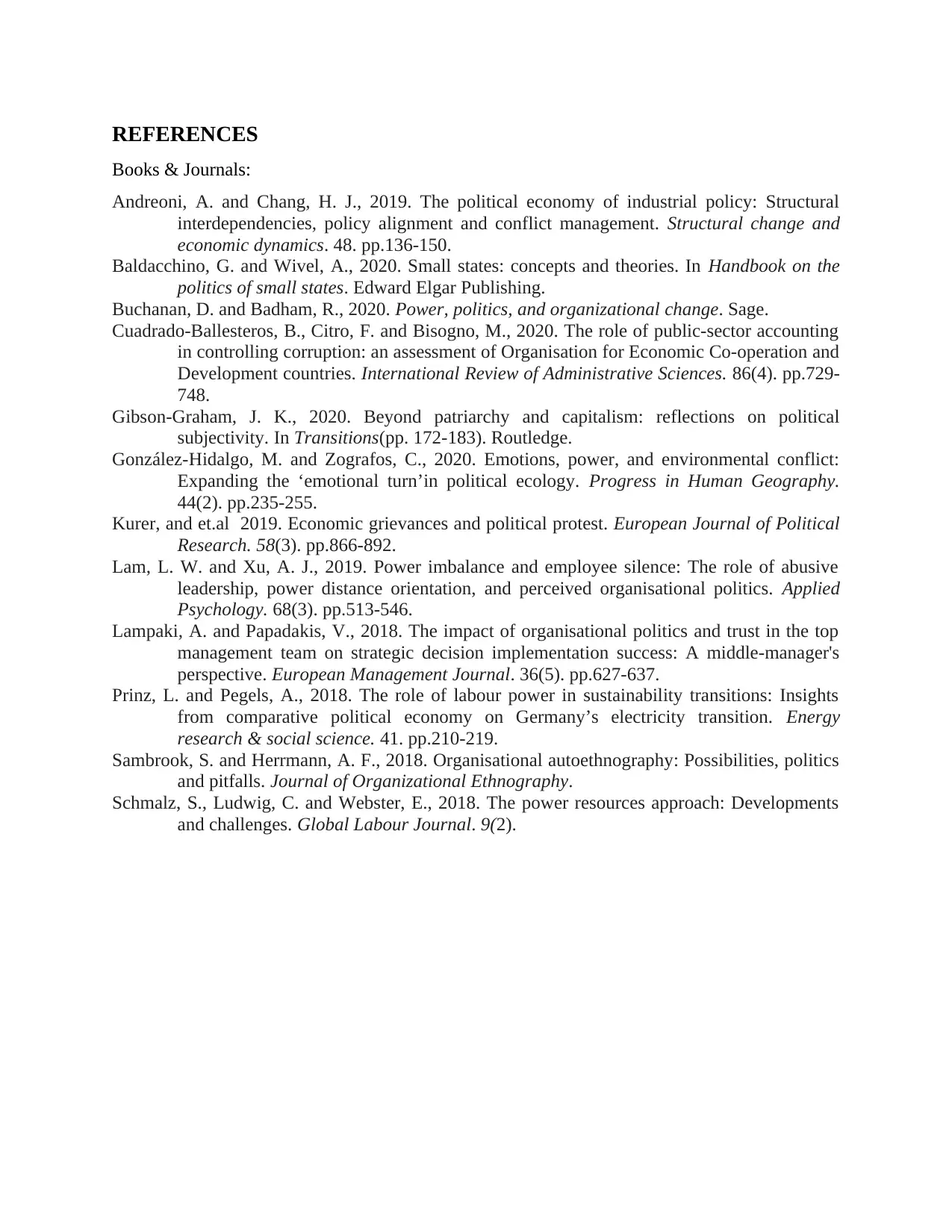
REFERENCES
Books & Journals:
Andreoni, A. and Chang, H. J., 2019. The political economy of industrial policy: Structural
interdependencies, policy alignment and conflict management. Structural change and
economic dynamics. 48. pp.136-150.
Baldacchino, G. and Wivel, A., 2020. Small states: concepts and theories. In Handbook on the
politics of small states. Edward Elgar Publishing.
Buchanan, D. and Badham, R., 2020. Power, politics, and organizational change. Sage.
Cuadrado-Ballesteros, B., Citro, F. and Bisogno, M., 2020. The role of public-sector accounting
in controlling corruption: an assessment of Organisation for Economic Co-operation and
Development countries. International Review of Administrative Sciences. 86(4). pp.729-
748.
Gibson-Graham, J. K., 2020. Beyond patriarchy and capitalism: reflections on political
subjectivity. In Transitions(pp. 172-183). Routledge.
González-Hidalgo, M. and Zografos, C., 2020. Emotions, power, and environmental conflict:
Expanding the ‘emotional turn’in political ecology. Progress in Human Geography.
44(2). pp.235-255.
Kurer, and et.al 2019. Economic grievances and political protest. European Journal of Political
Research. 58(3). pp.866-892.
Lam, L. W. and Xu, A. J., 2019. Power imbalance and employee silence: The role of abusive
leadership, power distance orientation, and perceived organisational politics. Applied
Psychology. 68(3). pp.513-546.
Lampaki, A. and Papadakis, V., 2018. The impact of organisational politics and trust in the top
management team on strategic decision implementation success: A middle-manager's
perspective. European Management Journal. 36(5). pp.627-637.
Prinz, L. and Pegels, A., 2018. The role of labour power in sustainability transitions: Insights
from comparative political economy on Germany’s electricity transition. Energy
research & social science. 41. pp.210-219.
Sambrook, S. and Herrmann, A. F., 2018. Organisational autoethnography: Possibilities, politics
and pitfalls. Journal of Organizational Ethnography.
Schmalz, S., Ludwig, C. and Webster, E., 2018. The power resources approach: Developments
and challenges. Global Labour Journal. 9(2).
Books & Journals:
Andreoni, A. and Chang, H. J., 2019. The political economy of industrial policy: Structural
interdependencies, policy alignment and conflict management. Structural change and
economic dynamics. 48. pp.136-150.
Baldacchino, G. and Wivel, A., 2020. Small states: concepts and theories. In Handbook on the
politics of small states. Edward Elgar Publishing.
Buchanan, D. and Badham, R., 2020. Power, politics, and organizational change. Sage.
Cuadrado-Ballesteros, B., Citro, F. and Bisogno, M., 2020. The role of public-sector accounting
in controlling corruption: an assessment of Organisation for Economic Co-operation and
Development countries. International Review of Administrative Sciences. 86(4). pp.729-
748.
Gibson-Graham, J. K., 2020. Beyond patriarchy and capitalism: reflections on political
subjectivity. In Transitions(pp. 172-183). Routledge.
González-Hidalgo, M. and Zografos, C., 2020. Emotions, power, and environmental conflict:
Expanding the ‘emotional turn’in political ecology. Progress in Human Geography.
44(2). pp.235-255.
Kurer, and et.al 2019. Economic grievances and political protest. European Journal of Political
Research. 58(3). pp.866-892.
Lam, L. W. and Xu, A. J., 2019. Power imbalance and employee silence: The role of abusive
leadership, power distance orientation, and perceived organisational politics. Applied
Psychology. 68(3). pp.513-546.
Lampaki, A. and Papadakis, V., 2018. The impact of organisational politics and trust in the top
management team on strategic decision implementation success: A middle-manager's
perspective. European Management Journal. 36(5). pp.627-637.
Prinz, L. and Pegels, A., 2018. The role of labour power in sustainability transitions: Insights
from comparative political economy on Germany’s electricity transition. Energy
research & social science. 41. pp.210-219.
Sambrook, S. and Herrmann, A. F., 2018. Organisational autoethnography: Possibilities, politics
and pitfalls. Journal of Organizational Ethnography.
Schmalz, S., Ludwig, C. and Webster, E., 2018. The power resources approach: Developments
and challenges. Global Labour Journal. 9(2).
1 out of 10
Related Documents
Your All-in-One AI-Powered Toolkit for Academic Success.
+13062052269
info@desklib.com
Available 24*7 on WhatsApp / Email
![[object Object]](/_next/static/media/star-bottom.7253800d.svg)
Unlock your academic potential
Copyright © 2020–2026 A2Z Services. All Rights Reserved. Developed and managed by ZUCOL.




